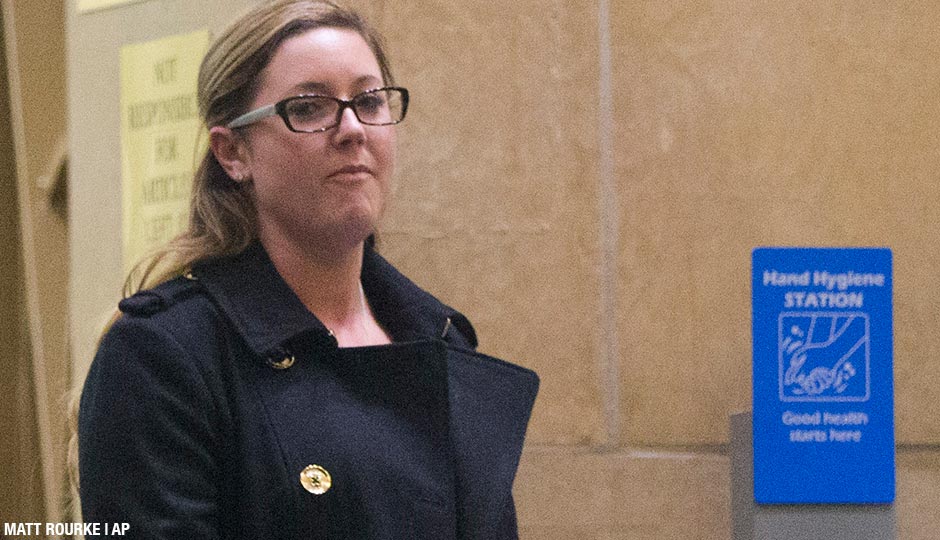Judge Denies Kathryn Knott Request to Reconsider Jail Sentence

Kathryn Knott walks from the Criminal Justice Center Thursday, Dec. 17, 2015, in Philadelphia.
Kathryn Knott and her attorney Bill Brennan were in room 908 of the Criminal Justice Center this morning to argue that Knott’s sentence for her role in the September 2014 attack on two gay men in Center City should be reduced. Judge Roxanne Covington denied Knott’s request.
In February, Knott was sentenced to five to 10 months in jail, and she is currently serving her second month of that sentence, a point Brennan made several times at today’s hearing.
Knott, wearing civilian clothes, entered the courtroom later than expected as a result of delays in her transportation from Riverside Correctional Facility. Representing the Commonwealth of Pennsylvania was Philadelphia Assistant District Attorney Allison Ruth, who rebutted Brennan’s points for why Knott deserved a sentence less than total incarceration.
Brennan, who replaced Louis Busico as Knott’s lawyer, began his appeal to the judge by arguing a lack of parity among the sentences of Knott and her co-defendants, Kevin Harrigan and Philip Williams, both of whom received no jail time.
Brennan proposed letting Knott out of jail on work release or commuting her sentence to house arrest. The big difference between Knott’s situation and that of Harrigan and Williams, however, is that Knott did not accept a plea deal as they did, and instead elected to go to trial. However, Brennan argued, his client should not be penalized for exercising her constitutional right to due process.
He shared that Knott has a job waiting for her upon her release, as well as a private residence in Fox Chase.
In her response, which she delivered firmly and deliberately, Covington addressed the differences between the defendants’ sentences, stressing that while everyone has a right to due process, the court encourages plea bargaining to save both defendants and victims the stress of a trial and allow both parties to come to an agreement. Also, all defendants are informed when pleas are set forth that a plea deal includes a better offer than what an eventual sentence would dictate and that each defendant’s case is exclusive and not affected by others.
Brennan pointed to Knott’s acquittal on the more serious charge of felony aggravated assault — although she was convicted of simple assault, conspiracy and reckless endangerment — as evidence that a sentence reduction is warranted.
He repeatedly stated that Knott is doing well in prison — she has a job cleaning bathrooms, toilets, and showers. While Brennan touted examples of Knott’s good behavior and compliance with her sentence, Ruth disagreed that Knott deserved positive recognition for this. She shouldn’t get credit for things she’s supposed to do, like not causing trouble while serving her sentence, Ruth said.
Ruth was even more adamantly opposed to the suggestion that Knott make a public service announcement against the type of crime of which she was convicted.
“It would be comical if it wasn’t so offensive,” Ruth said of the idea. This aptly sums up her tone throughout her argument. Ruth appeared incredulous that a hearing to reduce Knott’s sentence was even taking place. Nothing had changed since Knott was sentenced, and Brennan did not provide any new arguments.
Ruth also brought up Knott’s offensive tweets as evidence of Knott’s attitude toward homosexuals and said that someone who feels that way is absolutely not the right person to make a public service announcement.
Covington likewise expressed skepticism about Knott’s regret, saying that when she read an apology to the victims, she showed a disconnect from the incident. Covington also doubted that Knott comprehended the offensiveness of her tweets.
Ruth went on to remind the court that Andrew Haught, one of the victims of the attack, suffered a broken jaw. Ruth spoke through a clenched jaw to illustrate what Haught endured and how he spoke while his jaw was wired shut and that he could eat only a liquid diet for some time. It was a hate crime that could have happened to anyone that was different from Knott and her friends, Ruth insisted.
Brennan did address the anger and the “ripple effects” this case has caused in the community, and suggested allowing Knott to do something proactive and productive, such as a PSA, instead of simply waiting for her eventual release from jail. He implied that it could potentially prevent something like this from happening in the future.
Brennan even went so far as to invoke the words of Abraham Lincoln — “… mercy bears richer fruit than strict justice,” he quoted the former president. Ruth had some words of her own that apparently resonated more closely with the judge.
“Hate is hate, enough is enough, and the defendant’s sentence should remain,” Ruth said. And Covington echoed that sentiment in her ruling, saying that hatred toward any group is no different than hatred toward all of us.
Covington reminded Knott and her attorney that the original sentence is well within the guidelines and not excessive. She concluded her explanation by saying that a reduction in Knott’s sentence would depreciate the seriousness of the crime.
Everyone has a right to be who we are, she continued, to love whoever, and enjoy the city without fear of an attack.
Follow @BretttKlein on Twitter.


